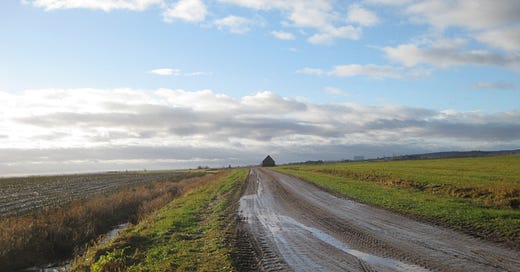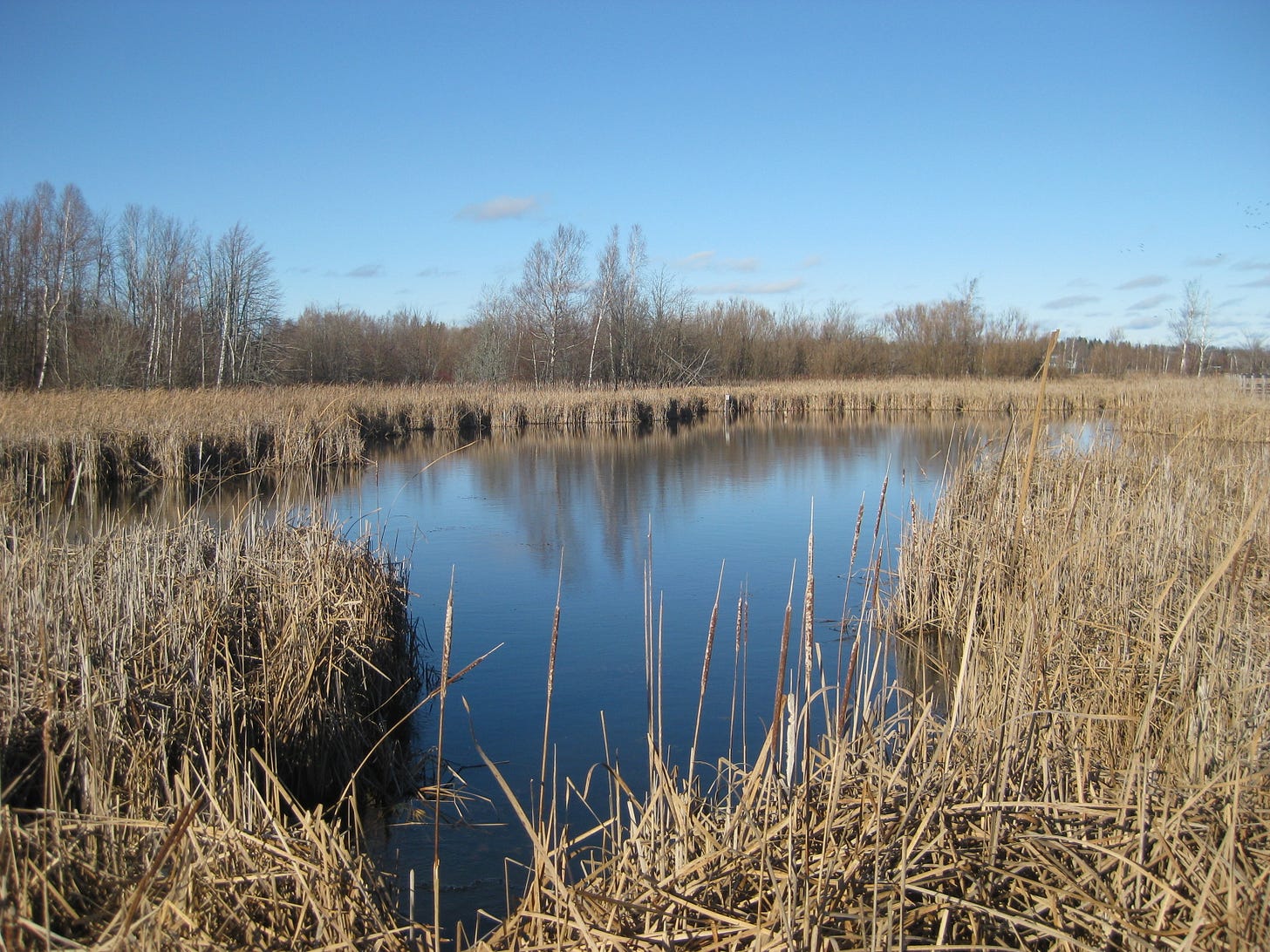The covered bridge, Tantramar Marsh, Sackville, New Brunswick. Photo Linda Pannozzo
Swamps are some of the most productive habitats on Earth. They teem with life, serve as nurseries, provide services to humanity like flood control, storm protection and water filtration, and they are fast disappearing. We don’t much like to call them swamps anymore, we call them wetlands now, land covered with fresh or salt water or both, situated at the edge or mouth of an ocean, pond, or river. Since we don’t much like to wade into them — and if they’ve escaped the ravages of development — they tend to be self-willed. True wilderness.
Henry David Thoreau had a special love of swamps. In a piece titled “Walking,” written sometime before his death in May of 1862 and eventually published in The Atlantic, Thoreau wrote:
“Hope and the future for me are not in lawns and cultivated fields, but in the impervious and quaking swamps. When, formerly, I have analyzed my partiality for some farm which I had contemplated purchasing, I have frequently found that I was attracted solely by a few square rods of impermeable and unfathomable bog, a natural sink in one corner of it. That was the jewel which dazzled me… if it were proposed to me to dwell in the neighbourhood of the most beautiful garden that ever human art contrived, or else of a dismal swamp, I should certainly decide for the swamp.”
I have titled my offering The Quaking Swamp Journal as an ode to thinkers like Thoreau, who recognized that our salvation — hope and the future — lies in the natural world. But the idea of the swamp, being unencumbered and self-willed, is a metaphor for the kind of writing I hope to be offering here.
Part of the Tantramar Marsh in Sackville New Brunswick. Photo Linda Pannozzo
I’ve been described as a journalist with a “compulsion to question everything,” including authority. This has led me, at times, to write stories that challenge the accepted narrative, or to uncover information not previously reported by the mainstream media. Being able to raise legitimate questions — with a good chance of them being answered — is central to a democratic society.
While my “beat” over the last decade at least has mostly been forestry, or the fisheries, I’ve also written about oil and gas, fracking, species at risk, protected areas, air and water pollution, Mi’kmaq archaeology, aquaculture, climate change, economics, green-washing, civil liberties, and COVID-19.
If you go to my Web page, you can find a lot of my previous work. I’ll probably be referring to, or linking to many of these earlier pieces in my future writing.
A big part of the reason I’ve decided to start The Quaking Swamp Journal is because I don’t always want to write in the ways I’ve been expected to. In addition to “hard hitting” investigations, I want to be able to write an essay, a reflection, a photo essay, a book review, a Q&A, or maybe some creative non-fiction. I also want my work to reflect the complexity and nuance that exists in the world, and not contribute unnecessarily to the increasing polarization we are seeing in our society.
Many of the stories I’ve written about over the years involved some conflict over some dwindling resource. Usually these stories are presented in the mainstream media with easily digestible soundbites and as having only two sides. But what I’ve often found is that issues don’t typically break down over neatly defined lines like these — most issues are actually very complex. I try not to shy away from this complexity.
One of my heroes is author, journalist, and activist, Arundhati Roy. Recently I heard her interviewed about her book of essays exploring the notion of freedom: Azadi: Freedom. Fascism. Fiction. In the interview, Roy points out that freedom is under threat in a number of ways. The most obvious is in war and during military occupations. Roy points to the highly militarized zone of Kashmir, India’s only Muslim-majority state, where the government has imposed de-facto martial law with the consequence, intended or not, of silencing it. Roy has written passionately and extensively about the subject. But the notion of freedom has other interpretations including the ability “to cross boundaries that are set by other people, by ideology, by character, or by so much silo-ization that is taking place increasingly on every side.” She writes that her feeling about the loss of Azadi [freedom] comes from “the assault on thought now.”
Roy says, “I was trying to explain to somebody that it's like the amount of information and thought and falseness and realness and everything that every human being is expected to deal with now, it seems like you're trying to find your way out of a forest, but the trees are also walking around, and the mango trees have jackfruit on them and the banana trees are growing pineapples and the coconut trees are growing mangoes, and so there are no coordinates… every one of us is being tormented in some ways, unable to find our way out because we don't have a compass, we don't have coordinates, nothing that you thought was real is real.”
This Substack offering means two things to me: It allows me to expand in my writing, and to explore ideas and pursue stories freely — not bound by the dictates of groupthink or the constraints of the very limiting and sometimes oppressive mainstream narrative. But it’s also about me trying to find my way out of the forest Roy was talking about.
If you’re interested in reading these pieces, they will be freely offered to subscribers, and will come to your inbox when they are published. At some point I’ll turn on the paid subscription option — but this will not impact the frequency or the content of what I post. It will simply give those who want to, the option of supporting my work.






Hi Linda, I stumbled across this writing place of yours by accident. Someone posted a link to your latest article. I subscribed as soon as I finished reading the article.
I have read much of your writing in the past, particularly in the Halifax Examiner, and I have always been impressed by your prose, insights and detail. I look forward to reading more from you here.
I am currently preparing for COP15 Biodioversity in Montreal where I am thrilled to be a member of the Canadian delegation. These essays are helping me sort my thoughts and priorities…. finding them is perfect timing for me.
I find I keep coming back like a homing pigeon to things you write, Linda. From your Genuine Progress Index Reports with Ron Coleman, to your awesome coverage and really comprehensive grasp of the subject in last year's "Biodiversity Hotspot Primed for Logging" of the Halifax Examiner, to the gentle and thoughtful development in the Q&A with Wayne Mackay on vaccine passports, and to yesterday's moving and beautiful tribute to Jeffrey Hutchings (what a wonderful man!) and so many other in-depth explorations. And now swamps! ... you’ve just connected me with my childhood growing up living on a boat moored in Seattle's Portage Bay and spending many solitary hours in a nearby swamp (close to U of W's Arboretum) hanging over the edge of a dingy watching the fish lingering in the boat's shadow or walking gingerly about on a huge maze of floating reed islands that truly quaked underfoot (all of which is now covered with a 4 lane highways because it didn't matter). Thank you for everything you do and thank you for what is to come. Can't wait.